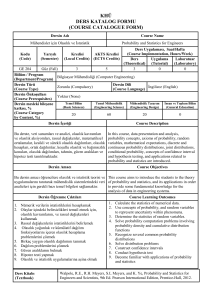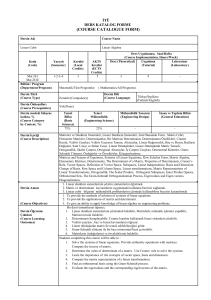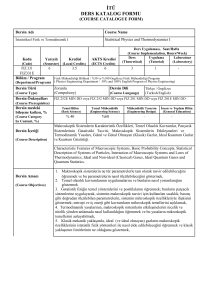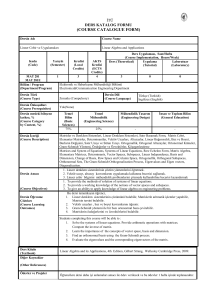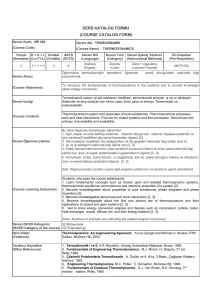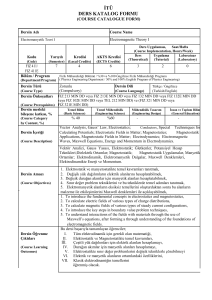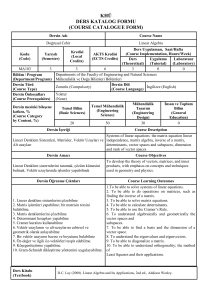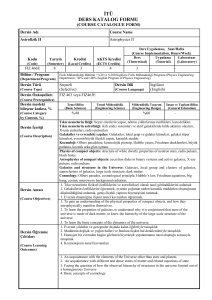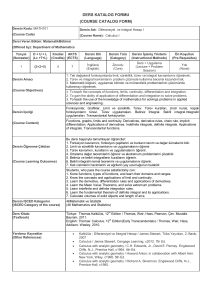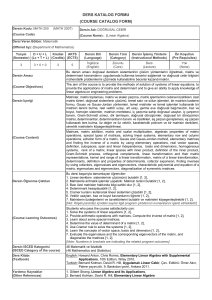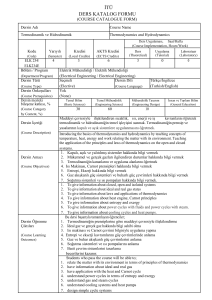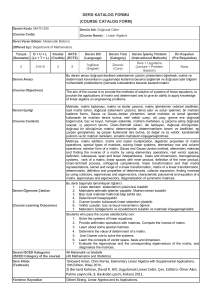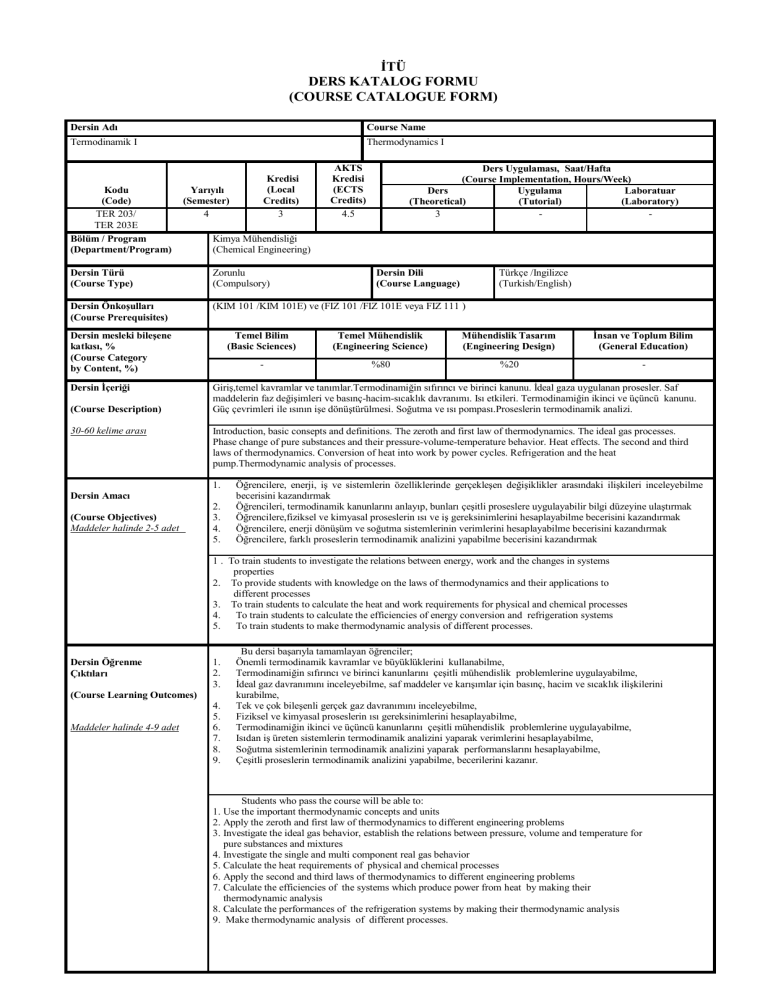
İTÜ
DERS KATALOG FORMU
(COURSE CATALOGUE FORM)
Dersin Adı
Course Name
Termodinamik I
Thermodynamics I
Kodu
(Code)
TER 203/
TER 203E
Bölüm / Program
(Department/Program)
Yarıyılı
(Semester)
4
Kredisi
(Local
Credits)
3
Ders Uygulaması, Saat/Hafta
(Course Implementation, Hours/Week)
Ders
Uygulama
Laboratuar
(Theoretical)
(Tutorial)
(Laboratory)
3
-
AKTS
Kredisi
(ECTS
Credits)
4.5
Kimya Mühendisliği
(Chemical Engineering)
Dersin Türü
(Course Type)
Zorunlu
(Compulsory)
Dersin Önkoşulları
(Course Prerequisites)
(KIM 101 /KIM 101E) ve (FIZ 101 /FIZ 101E veya FIZ 111 )
Dersin mesleki bileşene
katkısı, %
(Course Category
by Content, %)
Dersin İçeriği
(Course Description)
30-60 kelime arası
Temel Bilim
(Basic Sciences)
Temel Mühendislik
(Engineering Science)
Mühendislik Tasarım
(Engineering Design)
İnsan ve Toplum Bilim
(General Education)
-
%80
%20
-
Giriş,temel kavramlar ve tanımlar.Termodinamiğin sıfırıncı ve birinci kanunu. İdeal gaza uygulanan prosesler. Saf
maddelerin faz değişimleri ve basınç-hacim-sıcaklık davranımı. Isı etkileri. Termodinamiğin ikinci ve üçüncü kanunu.
Güç çevrimleri ile ısının işe dönüştürülmesi. Soğutma ve ısı pompası.Proseslerin termodinamik analizi.
Introduction, basic consepts and definitions. The zeroth and first law of thermodynamics. The ideal gas processes.
Phase change of pure substances and their pressure-volume-temperature behavior. Heat effects. The second and third
laws of thermodynamics. Conversion of heat into work by power cycles. Refrigeration and the heat
pump.Thermodynamic analysis of processes.
1.
Dersin Amacı
(Course Objectives)
Maddeler halinde 2-5 adet
Türkçe /Ingilizce
(Turkish/English)
Dersin Dili
(Course Language)
2.
3.
4.
5.
Öğrencilere, enerji, iş ve sistemlerin özelliklerinde gerçekleşen değişiklikler arasındaki ilişkileri inceleyebilme
becerisini kazandırmak
Öğrencileri, termodinamik kanunlarını anlayıp, bunları çeşitli proseslere uygulayabilir bilgi düzeyine ulaştırmak
Öğrencilere,fiziksel ve kimyasal proseslerin ısı ve iş gereksinimlerini hesaplayabilme becerisini kazandırmak
Öğrencilere, enerji dönüşüm ve soğutma sistemlerinin verimlerini hesaplayabilme becerisini kazandırmak
Öğrencilere, farklı proseslerin termodinamik analizini yapabilme becerisini kazandırmak
1 . To train students to investigate the relations between energy, work and the changes in systems
properties
2. To provide students with knowledge on the laws of thermodynamics and their applications to
different processes
3. To train students to calculate the heat and work requirements for physical and chemical processes
4. To train students to calculate the efficiencies of energy conversion and refrigeration systems
5. To train students to make thermodynamic analysis of different processes.
Dersin Öğrenme
Çıktıları
1.
2.
3.
(Course Learning Outcomes)
Maddeler halinde 4-9 adet
4.
5.
6.
7.
8.
9.
Bu dersi başarıyla tamamlayan öğrenciler;
Önemli termodinamik kavramlar ve büyüklüklerini kullanabilme,
Termodinamiğin sıfırıncı ve birinci kanunlarını çeşitli mühendislik problemlerine uygulayabilme,
İdeal gaz davranımını inceleyebilme, saf maddeler ve karışımlar için basınç, hacim ve sıcaklık ilişkilerini
kurabilme,
Tek ve çok bileşenli gerçek gaz davranımını inceleyebilme,
Fiziksel ve kimyasal proseslerin ısı gereksinimlerini hesaplayabilme,
Termodinamiğin ikinci ve üçüncü kanunlarını çeşitli mühendislik problemlerine uygulayabilme,
Isıdan iş üreten sistemlerin termodinamik analizini yaparak verimlerini hesaplayabilme,
Soğutma sistemlerinin termodinamik analizini yaparak performanslarını hesaplayabilme,
Çeşitli proseslerin termodinamik analizini yapabilme, becerilerini kazanır.
Students who pass the course will be able to:
1. Use the important thermodynamic concepts and units
2. Apply the zeroth and first law of thermodynamics to different engineering problems
3. Investigate the ideal gas behavior, establish the relations between pressure, volume and temperature for
pure substances and mixtures
4. Investigate the single and multi component real gas behavior
5. Calculate the heat requirements of physical and chemical processes
6. Apply the second and third laws of thermodynamics to different engineering problems
7. Calculate the efficiencies of the systems which produce power from heat by making their
thermodynamic analysis
8. Calculate the performances of the refrigeration systems by making their thermodynamic analysis
9. Make thermodynamic analysis of different processes.
Ders Kitabı
(Textbook)
Smith J.M., Van Ness H.C., Abbot M.M., Introduction to Chemical Engineering Thermodynamics, 7th
Ed., McGraw-Hill, 2005. (ISBN: 978007310445)
Diğer Kaynaklar
(Other References)
Maddeler halinde en çok 5
adet
Çengel Y., Boles M.A., Thermodynamics- An Engineering Approach, McGraw-Hill, 2006.
(ISBN: 978007330537)
Sandler, S.I., Chemical, Biochemical and Engineering Thermodynamics, 4th Ed., John Wiley & Sons
Inc., 2006. (ISBN: 9780471661740)
Modell M., Reid R.C., Thermodynamics and Its Applications, Prentice-Hal,1983. (ISBN: 97801391501)
Ödevler ve Projeler
Öğrencilere, dersin her konusu ile ilgili ödevler verilecek ve bu ödevler bir hafta sonra toplanacaktır.
(Homework & Projects
Homework problems relating with each subject of the course will be assigned and to be handed in a
week after they are assigned.
Laboratuar Uygulamaları
(Laboratory Work)
Bilgisayar Kullanımı
Ödev problemlerinden bazılarının çözümü için bilgisayar kullanılacaktır.
(Computer Use)
Computer will be used for the solution of some homework problems.
Diğer Uygulamalar
Dönem süresince düzenli olarak sınıf içi çalışmalar yapılacaktır.
(Other Activities)
In-class studies will be held regularly during the semester.
Başarı Değerlendirme
Sistemi
Faaliyetler
(Activities)
Yıl İçi Sınavları
(Midterm Exams)
Kısa Sınavlar
(Quizzes)
Ödevler ve Sınıf İçi Çalışmalar
(Homework and In Class Studies )
(Assessment Criteria)
Projeler
(Projects)
Dönem Ödevi/Projesi
(Term Paper/Project)
Laboratuar Uygulaması
(Laboratory Work)
Diğer Uygulamalar
(Other Activities)
Final Sınavı
(Final Exam)
Adedi
(Quantity)
2
7 ÖDEV
7 SINIF
IÇI
ÇALIŞMA
1
Değerlendirmedeki Katkısı, %
(Effects on Grading, %)
1. YIL IÇI SINAVI (%15)
2. YIL IÇI SINAVI (%25)
%20
%40
DERS PLANI
Hafta
1
2
3
Konular
Termodinamiğin kapsamı, Boyutlar ve birimler, Temel kavramlar
Termodinamiğin sıfırıncı kanunu, İç enerji, Termodinamiğin birinci kanunu, Kapalı
sistemler için enerji dengesi, Termodinamik özellik ve hal fonksiyonları, Entalpi
Açık sistemler için kütle ve enerji dengeleri, Denge, Faz kuralı, Tersinir proses, Isı
kapasitesi ve özgül ısı
Dersin
Çıktıları
1
1,2
1,2
4
İdeal gaza uygulanan prosesler(sabit hacim, sabit basınç, izotermal, adyabatik,
politropik)
1,2,3
5
Saf maddelerin özellikleri, Saf maddelerin PVT davranışları, Tek faz bölgesi, Virial
denklem ve uygulanması
Kübik hal denklemleri(van der Walls ve Redlich-Kwong), Genel bir kübik hal denklemi,
Hal denklemlerinin değişkenlerinin saptanması, Mütekabil haller teoremi, Asentrik
faktör, Genel kübik hal denkleminin buhar ve buhar benzeri kökleri, Genel kübik hal
denkleminin sıvı ve sıvı benzeri kökleri
Gazlar için genelleştirilmiş bağıntılar, Sıkıştırılabilme faktörü için Pitzer bağıntıları,
İkinci virial katsayı için Pitzer bağıntıları, İdeal gaz karışımları için PVT davranışları,
Gerçek gaz karışımları için PVT davranışları
Isı etkileri (duyulur ısı, gizli ısı), Standard tepkime ısısı, Standard oluşum ısısı, Standard
yanma ısısı
1,3
6
7
8
1,3,4
1,3,4
1,2,5
9
Sıcaklığın tepkime ısısına etkisi, Adyabatik tepkime sıcaklığı, Endüstriyel tepkimelerin
ısı etkileri, Karışma proseslerinin ısı etkileri
1,2,5
10
Termodinamiğin ikinci kanununun tanımı, Isı makinası, Carnot çevrimi, Entropi, Katı
ve sıvıların entropi değişimi, İdeal bir gazın entropi değişimi, İkinci kanunun
matematiksel ifadesi, Açık sistemler için entropi dengesi
1,2,3,4,6
11
İdeal işin hesaplanması, Kayıp iş, Termodinamiğin üçüncü kanunu, Buharlı güç
çevrimleri (Carnot, Rankine ve tekrar ısıtmalı Rankine çevrimleri)
1,2,4,6,7
12
Carnot soğutma çevrimi, buhar sıkıştırmalı soğutma çevrimi, Soğutucu akışkan seçimi,
Absorbsiyonlu soğutma çevrimi, Isı pompası
1,2,4,8
13
Açık ve kapalı sistemlerin kullanılabilirliği (Ekserji), Proseslerin termodinamik analizi
14
Proseslerin termodinamik analizi
1,2,3,4,5,
6,7,8,9
1,2,3,4,5,
6,7,8,9
COURSE PLAN
Weeks
1
2
3
4
5
6
7
8
9
10
11
12
13
14
Topics
The scope of thermodynamics, Dimensions and units, Basic definitions
Zeroth law of thermodynamics, Internal energy, The first law of thermodynamics,
Energy balance for closed systems, Thermodynamic state and state functions,
Enthalpy
Mass and energy balances for open systems, Equilibrium, The phase rule, The
reversible process, Heat capacity and specific heat
The ideal gas processes (constant-volume, isobaric,isothermal, adiabatic, polytropic)
PVT behavior of pure substances, Single phase region, The virial equation and its
application
Cubic equations of state (van der Walls and Redlich-Kwong),A generic cubic
equation of state, Determination of state parameters, Theorem of corresponding
states, acentric factor, Vapor&vapor like roots of the generic cubic equation of state,
Liquid&liquid like roots of the generic cubic equation of state
Generalized correlations for gases, Pitzer correlations for the compressibility factor,
Pitzer correlations for the second virial coefficient, PVT relations of ideal gas
mixtures, PVT relations of real gas mixtures
Heat effects (sensible heat, latent heat), Standard heat of reaction, Standard heat of
formation, Standard heat of combustion
Effect of temperature on the standard heat of reaction, Adiabatic reaction temperature
Heat effects of industrial reactions, Heat effects of mixing processes
Statements of the second law, Heat engines, The carnot cycle, Entropy, Entropy
changes of solids and liquids, Entropy changes of an ideal gas, Mathematical
statement of the second law, Entropy balance for open systems
Calculation of ideal work, Lost work, The third law of thermodynamics, Vapor power
cycles (Carnot, Rankine and reheat Rankine cycles)
The carnot refrigerator, The vapor compression cycle, The choise of refrigerant,
Adsorption refrigeration, The heat pump
Availability (Exergy) of open and closed systems, Thermodynamic analysis of
processes
Thermodynamic analysis of processes
Course
Outcomes
1
1,2
1,2
1,2,3
1,3
1,3,4
1,3,4
1,2,5
1,2,5
1,2,3,4,6
1,2,4,6,7
1,2,4,8
1,2,3,4,5,6,
7,8,9
1,2,3,4,5,6,
7,8,9
Dersin Kimya Mühendisliği Programıyla İlişkisi
Katkı
Seviyesi
1
2
3
Programın mezuna kazandıracağı bilgi ve beceriler (programa ait çıktılar)
a
b
c
d
e
Matematik, fen bilimleri ve mühendislik bilgilerini kimya mühendisliği problemlerine
uygulayabilme becerisi.
Kimya Mühendisliği ve ilgili alanlardaki mühendislik problemlerini saptama, tanımlama ve çözme
becerisi.
Deney tasarlama, veri toplama, analiz etme ve yorumlama becerisi
X
X
X
Modern mühendislik teknik ve araçları ile bilişim teknolojilerini etkin bir şekilde kullanma
becerisi
Yaşam boyu öğrenmenin önemini benimsemiş olarak, bilim ve teknolojideki gelişmeleri izleyerek
kendini sürekli yenileme becerisi
X
X
f
g
h
i
j
1: Az, 2. Kısmi, 3. Tam
Relationship between the Course and Chemical Engineering Curriculum
Level of
Contribution
1
2
3
Program Outcomes
a
b
X
Ability to apply knowledge of mathematics, science, and engineering to chemical engineering
problems.
Ability to identify, formulate, and solve engineering problems in chemical engineering and
related fields
X
c
Ability to design and conduct experiments, as well as to analyze and interpret data
X
d
Ability to use the techniques, skills, and modern engineering and computing tools necessary for
engineering practice
Recognition of the need for, and an ability to engage in life-long learning
X
e
X
f
g
h
i
j
1: Little, 2. Partial, 3. Full
Düzenleyenler (Prepared by)
Tarih (Date)
30/12/1013
İmza (Signature)

